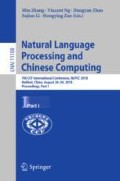Abstract
Recently, the seq2seq abstractive summarization models have achieved good results on the CNN/Daily Mail dataset. Still, how to improve abstractive methods with extractive methods is a good research direction, since extractive methods have their potentials of exploiting various efficient features for extracting important sentences in one text. In this paper, in order to improve the semantic relevance of abstractive summaries, we adopt the WordNet based sentence ranking algorithm to extract the sentences which are most semantically to one text. Then, we design a dual attentional seq2seq framework to generate summaries with consideration of the extracted information. At the same time, we combine pointer-generator and coverage mechanisms to solve the problems of out-of-vocabulary (OOV) words and duplicate words which exist in the abstractive models. Experiments on the CNN/Daily Mail dataset show that our models achieve competitive performance with the state-of-the-art ROUGE scores. Human evaluations also show that the summaries generated by our models have high semantic relevance to the original text.
Access this chapter
Tax calculation will be finalised at checkout
Purchases are for personal use only
References
Bahdanau, D., Cho, K., Bengio, Y.: Neural machine translation by jointly learning to align and translate. arXiv preprint arXiv:1409.0473 (2014)
Cao, Z., Li, W., Li, S., Wei, F., Li, Y.: Attsum: Joint learning of focusing and summarization with neural attention. arXiv preprint arXiv:1604.00125 (2016)
Cheng, J., Lapata, M.: Neural summarization by extracting sentences and words. arXiv preprint arXiv:1603.07252 (2016)
Filippova, K., Strube, M.: Dependency tree based sentence compression. In: Proceedings of the Fifth International Natural Language Generation Conference, pp. 25–32. Association for Computational Linguistics (2008)
Gu, J., Lu, Z., Li, H., Li, V.O.: Incorporating copying mechanism in sequence-to-sequence learning. arXiv preprint arXiv:1603.06393 (2016)
Gulcehre, C., Ahn, S., Nallapati, R., Zhou, B., Bengio, Y.: Pointing the unknown words. arXiv preprint arXiv:1603.08148 (2016)
Lin, C.Y.: Rouge: A package for automatic evaluation of summaries. In: Text Summarization Branches Out (2004)
Lopyrev, K.: Generating news headlines with recurrent neural networks. arXiv preprint arXiv:1512.01712 (2015)
Ma, S., Sun, X., Xu, J., Wang, H., Li, W., Su, Q.: Improving semantic relevance for sequence-to-sequence learning of chinese social media text summarization. arXiv preprint arXiv:1706.02459 (2017)
Nallapati, R., Zhai, F., Zhou, B.: Summarunner: A recurrent neural network based sequence model for extractive summarization of documents. In: AAAI, pp. 3075–3081 (2017)
Nallapati, R., Zhou, B., Gulcehre, C., Xiang, B., et al.: Abstractive text summarization using sequence-to-sequence rnns and beyond. arXiv preprint arXiv:1602.06023 (2016)
Nema, P., Khapra, M., Laha, A., Ravindran, B.: Diversity driven attention model for query-based abstractive summarization. arXiv preprint arXiv:1704.08300 (2017)
Pal, A.R., Saha, D.: An approach to automatic text summarization using wordnet. In: Advance Computing Conference (IACC), 2014 IEEE International, pp. 1169–1173. IEEE (2014)
Paulus, R., Xiong, C., Socher, R.: A deep reinforced model for abstractive summarization. arXiv preprint arXiv:1705.04304 (2017)
Rush, A.M., Chopra, S., Weston, J.: A neural attention model for abstractive sentence summarization. arXiv preprint arXiv:1509.00685 (2015)
See, A., Liu, P.J., Manning, C.D.: Get to the point: Summarization with pointer-generator networks. arXiv preprint arXiv:1704.04368 (2017)
Tan, J., Wan, X., Xiao, J.: Abstractive document summarization with a graph-based attentional neural model. In: Proceedings of the 55th Annual Meeting of the Association for Computational Linguistics (Volume 1: Long Papers), vol. 1, pp. 1171–1181 (2017)
Tu, Z., Lu, Z., Liu, Y., Liu, X., Li, H.: Modeling coverage for neural machine translation. arXiv preprint arXiv:1601.04811 (2016)
Zeng, W., Luo, W., Fidler, S., Urtasun, R.: Efficient summarization with read-again and copy mechanism. arXiv preprint arXiv:1611.03382 (2016)
Zhou, Q., Yang, N., Wei, F., Zhou, M.: Selective encoding for abstractive sentence summarization. arXiv preprint arXiv:1704.07073 (2017)
Acknowledgments
We thank the anonymous reviewers for their insightful comments on this paper. This work was partially supported by National Natural Science Foundation of China (61572049 and 61333018). The correspondence author is Sujian Li.
Author information
Authors and Affiliations
Corresponding author
Editor information
Editors and Affiliations
Rights and permissions
Copyright information
© 2018 Springer Nature Switzerland AG
About this paper
Cite this paper
Xie, N., Li, S., Ren, H., Zhai, Q. (2018). Abstractive Summarization Improved by WordNet-Based Extractive Sentences. In: Zhang, M., Ng, V., Zhao, D., Li, S., Zan, H. (eds) Natural Language Processing and Chinese Computing. NLPCC 2018. Lecture Notes in Computer Science(), vol 11108. Springer, Cham. https://doi.org/10.1007/978-3-319-99495-6_34
Download citation
DOI: https://doi.org/10.1007/978-3-319-99495-6_34
Published:
Publisher Name: Springer, Cham
Print ISBN: 978-3-319-99494-9
Online ISBN: 978-3-319-99495-6
eBook Packages: Computer ScienceComputer Science (R0)


